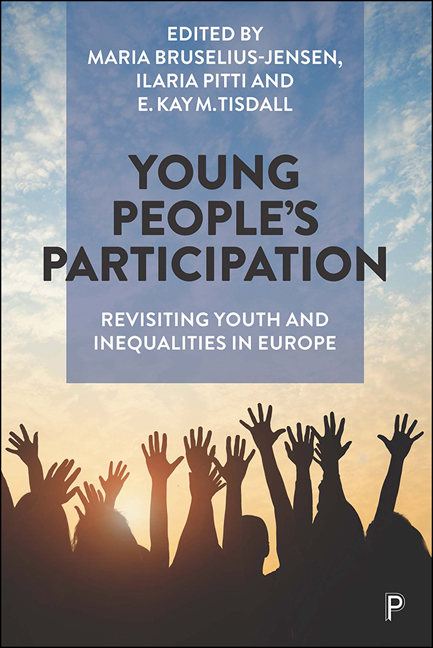Book contents
- Frontmatter
- Contents
- List of figures and tables
- Notes on contributors
- Acknowledgements
- 1 Revisiting young people's participation: an introduction
- PART I Young people's experiences of participation and engagement
- PART II Current state and conditions for young people’s participation: critiques and trends
- PART III Broadening participation: young people's own approaches to participation
- PART IV New opportunities for young people's participation: facilitating new forms of youth participation
- Index
8 - The participation project: how projects shape young people's participation
Published online by Cambridge University Press: 18 December 2021
- Frontmatter
- Contents
- List of figures and tables
- Notes on contributors
- Acknowledgements
- 1 Revisiting young people's participation: an introduction
- PART I Young people's experiences of participation and engagement
- PART II Current state and conditions for young people’s participation: critiques and trends
- PART III Broadening participation: young people's own approaches to participation
- PART IV New opportunities for young people's participation: facilitating new forms of youth participation
- Index
Summary
This chapter focuses on professionally facilitated efforts to promote young people's participation through project-based activities located within young people's everyday spaces. Inspired by theories of the emergence of a ‘project society’ (Jensen, 2012) and ‘projective regimes’ (Boltanski and Chiapello, 2005), the chapter discusses the implications of a regime driven by social mobility, fast and continuous innovation and managerial logics with the aim to promote societal activity through projects. Drawing on case studies of young people's experiences while taking part in two project-based initiatives that aim to promote young people's participation in school and in the psychiatric system respectively, the chapter demonstrates how this project regime greatly affects who, how and to what aims young people are able to participate in change and decision making.
Key findings
• Professionally facilitated projects are a core contemporary feature of young people's participation and generate both new opportunities and new barriers for their participation.
• These facilitated participatory spaces allow for less hierarchical relations between young people and professionals, but tend to have difficulties in addressing more permanent concerns in the arenas or institutions that accommodate the activities.
• Projects often follow predefined programmes. This allows for many organisations to apply the programmes, but limits the room for young people's own priorities.
• Projects often produce and reproduce inequalities because they tend to have a core group of highly engaged young participants, while the vast majority become mere recipients.
Introduction
Pupil 1: ‘On this school, like, suddenly, then we are a Rights Respecting School [RRS]. Yes, and then we are some kind of food school, and then we are suddenly another school.’
Pupil 2: ‘And physical activity school.’
Pupil 1: ‘Yes, and physical activity school.’ (Pupils from the Rights Council in an RRS)
RRSs are developed by UNICEF with the aim of implementing a rights-based teaching programme. The introduction of the programme into the Danish public school context is one of the cases followed in this study. In the opening quotes, young people who are members of the Rights Council in an RRS explain that being named as a ‘something’-school is a routine part of everyday school life.
- Type
- Chapter
- Information
- Young People’s ParticipationRevisiting Youth and Inequalities in Europe, pp. 119 - 136Publisher: Bristol University PressPrint publication year: 2021



